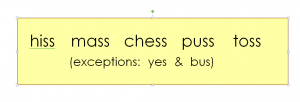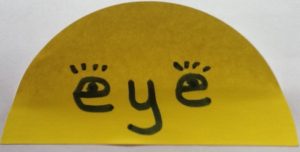
A little test for you! Can you guess which of the little words in the box above are small difficult words, which children will struggle to read? They’re all small, so does that make them equally simple?
Some Small Words are difficult small words!
Unfortunately, some one-syllable words look simple but, in fact, are very difficult to read because they have tricky sounds in them:

These small words confuse struggling readers. Maybe your child confuses the words was and saw, or struggles with simple words like is, has or his.
Why are these Small Difficult Words so Difficult?
The reason your child might struggle to read a word like has, is because it contains the tricky sound z. Children are taught the symbol z, (as in zip, zap, zeal), but are not always told that s can also be read as z (as in is his, as, was).
Children won’t recognise these small, difficult words, read with sound s at the end:

If you look at most small words ending in sound s, you will see that they are usually spelt with two ss:

There are 2 tricky sounds in the word was. A struggling child may read was as waz, unless he also knows that letter a is often read as sound o after letters w (wasp, want, wand, watch) and qu (quality).
You may need to offer your child lots of help with these small, difficult words. I try to avoid them, until we practise the appropriate vowel sounds. For example, I only introduce the word was, when I practise the 2 ways of writing sound o. Can you hear the o sound in was?
I wait to introduce the word saw until I practise different ways of writing sound aw. Can you hear the or sound in saw?
How can you Help your Child with Small, Difficult Words?
Please make sure your child can read small, simple (cvc) words, before you try more difficult words (see my First Blog Post on Small Words).
The key to helping your child with these small, difficult words, is to have some knowledge of the English Code. Simply put, the letters in our words are all symbols for sounds! (We draw a cat, and we also ‘draw’ a symbol for the sound c). You can see in the word cat, that the letter c is a symbol for the sound c, letter a is a symbol for sound a and letter t is a symbol for sound t.
But it is not so easy to understand the word saw. Here the letters a and w are pushed together to make a symbol for sound aw (read or).
Putting Theory into the Practice of Reading
What will you do if your child gets stuck on a small, difficult word like saw. Why not just point with a pencil to aw and say ‘try sound aw’ (pronounced or). He probably knows sound s, and you provide the problem sound. Simple! And no confusion with the word was! You may also need to remind him to start reading the word from the first sound (children often look at the whole word and guess).
Knowing the Code makes Small, Difficult Words Easier!
You will be ready to help your child, if you can break any word into its separate sounds. I have a sheet with all the sounds on them, but you don’t necessarily need one. You, like your child, just have to listen to the sounds in each word!
Children are also helped to read tricky words, because they can often anticipate the next word. Your child will surprise you, once he gains confidence. He will suddenly be able to anticipate difficult words. E.g. When he reads a sentence:

he will probably guess the word front. He will have read the other words, and he knows that a postman usually knocks on the front door! It is this knowledge and understanding of his language, which ultimately enables him to read anything, even those words that he doesn’t know.
Sight words Can be Difficult too:
Sight words can also be a problem, because they cannot be sounded out (segmented), and just have to be practised. Fortunately, there are very few of these words, contrary to popular belief. Eg

There are several ways in which children can be exposed frequently to these small, difficult words. The aim is to make these words recognisable in a sentence. My students have no difficulty with the word eye!

I encourage children to make big, sparkly, colourful versions of these words, and stick them on the wall, so they see them frequently. Alternatively, we play sight word Bingo or snap with them. For some reason, they don’t often cause big problems.
If you need more help:
Please Help Me? I Really Can’t Read!
This is the book I have written, to try to make it easier for you to help your child with reading. I watched my child struggle many years ago, and couldn’t help him. I didn’t know how to sound out words like was and saw, but have learnt a lot from my failure to help him.

If you would like a copy of my list of Sounds with all the different ways of spelling them, please let me know. Don’t forget to leave me an email address to send it to.
Next Blog: The consonant cluster! The great waste of time! Why children leave sounds out of ‘small words’.